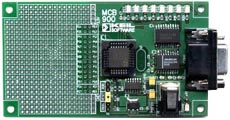| |
MCB900 Starter Kit for the Philips P89LPC932 8051 Microcontroller |
|
|
|
|
|
| |
The MCB900 is a comprehensive low-cost Starter System for the Philips P89LPC932 FLASH 8051 Microcontroller. The kit contains a featured-packed Evaluation Module fitted with a P89LPC932 microcontroller plus a special version of the µVISION2 8051 C development environment which only supports the Philips LPC devices. The IDE supports editing / compiling / simulating up to 4Kb of code (C + Assembler) for the LPC devices. A suite of suitable example programs are supplied with the software which can be compiled and then downloaded via ISP (In-System Programming) to the Target Device using the 'FLASH Magic' ISP software. Once a program is downloaded, the MCB900 can then be run without PC control and becomes a 'Standalone Microcontroller Module'.
This kit is designed for evaluating the Philips LPC family of microcontrollers. It encompasses the 8051 architecture plus the ability to write programs in C and download them to a real microcontroller mounted on a Target Board. This makes the Keil MCB900 kit ideal for low-budget high-specification designs and is therefore ideally suited to student projects. |
| |
|
|
 |
MCB900 Evaluation Board |
|
- Philips P89LP932 Microcontroller mounted in PLCC socket
-
LED array on Port 2
-
Prototyping area for user circuitry
-
RS-232 Port for ISP, debug and/or user application use
-
On-board power supply (9V unregulated input)
|
 |
LPC900 Development Studio |
|
- Feature-packed source code Editor, Project Manager and Make Utility
-
8051 Assembler
-
8051 ANSI-C Compiler
-
Software Simulator
-
ISD51 - In-System Debugger
-
Application Examples for the LPC family
-
All components of the Keil IDE are limited to a maximum of 4Kb of compiled code. No hardware support is available for multiple DPTR registers. No support is available for user libraries or floating point arithmetic.
|
 |
FLASHMagic ISP Software |
|
- Software Utility supporting In-System Programming (ISP) of Philips ISP devices
-
Supports downloading of HEX file output of the Keil IDE to the FLASH / EEPROM of the Target Microcontroller
-
Uses the Philips LPC Boot Loader method of ISP via the UART of the Target Device
-
Required spare PC COM port to be connected to the COM port of the MCB900 Module
|
 |
System Requirements |
|
- PC with one available serial (COM) port
-
Windows 95/98/ME/NT/2000/XP
-
One 3½-inch, 1.44MB disk drive
-
One CD-ROM drive
-
Please note: A suitable serial cable and power supply are NOT supplied with this kit.
|
| |
| |
Device Support (by family) |
|
|
|
|
|
| This product supports devices from the families listed below: |
| |
NXP (Philips):
-
8051 LPC (Low Pin Count) Microcontroller Family
|
|
The MCB900 prototyping board uses the Philips P89LPC932 which is a superset of the Philips P89LPC920, P89LPC921, P89LPC922, P89LPC930 & P89LPC931 devices. You may create application programs for these devices by ignoring the extra features of the LPC932.
|
| |
Device Support (by manufacturer / programming algorithm) |
|
|
|
|
| Philips Semiconductor | | | | BL - Boot Loader Algorithm: | | 8051 LPC (Low Pin Count) Microcontroller Family: | | P89LPC920, P89LPC922, P89LPC930, P89LPC931, P89LPC932 |
|  |


| Product Information |
| MCB900 Starter Kit for the Philips P89LPC932 8051 Microcontroller |
| Keil Software |
|
KEI-MCB900 |
| Discontinued Product |
|
|